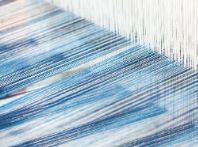
Woven fabric manufacturer New Focus Textiles has introduced forensic, DNA-based verification for recycled cotton which allows end-to-end traceability of its offering.
Haelixa’s DNA marker, applied to New Focus’s post-industrial and post-consumer cotton waste, stays intact through spinning, weaving, dyeing and finishing, giving brands scientific proof that recycled fibres are genuinely present in the fabrics they buy.

Discover B2B Marketing That Performs
Combine business intelligence and editorial excellence to reach engaged professionals across 36 leading media platforms.
This marks a significant move towards evidence-based verification in recycled material sourcing, addressing one of the main credibility gaps in the circular materials market.
Haelixa’s DNA marker is applied directly to post-industrial and post-consumer waste, before shredding, staying intact through New Focus Textiles’ mechanical recycling process. The non-toxic DNA marker, which is derived from Swiss mountain herbs, is a permanent tag, and cannot be removed or copied, remaining embedded throughout spinning, weaving, dyeing, and finishing.
At any point, the material can be tested in an accredited laboratory using a simple PCR analysis to confirm origin and verify the presence of recycled content. This method provides physical proof of the recycled fibre identity, going beyond certification schemes that rely on documentation and chain-of-custody declarations.
“Recycled claims need solid evidence,” said Patrick Strumpf, CEO of Haelixa. “By marking textile waste, manufacturers can scientifically prove the presence of recycled content in new fibres, yarns or garments and secure customers’ trust.”

US Tariffs are shifting - will you react or anticipate?
Don’t let policy changes catch you off guard. Stay proactive with real-time data and expert analysis.
By GlobalDataNew Focus Textiles produces GRS-certified recycled cotton fabrics from post-industrial and post-consumer feedstock under its T2T (Textile-to-Textile) programme. The integration of Haelixa’s DNA-based traceability ensures each recycled batch is scientifically identifiable and can be aligned with digital records on platforms such as TextileGenesis, enhancing material transparency at supplier, auditor, and brand level.
“Scientific verification strengthens customers’ trust,” said Jennie Peterson, PhD – Partner at New Focus Textiles. “Our buyers no longer need to rely on claims alone. We can verify the recycled origin of their fabrics with forensic evidence.”





